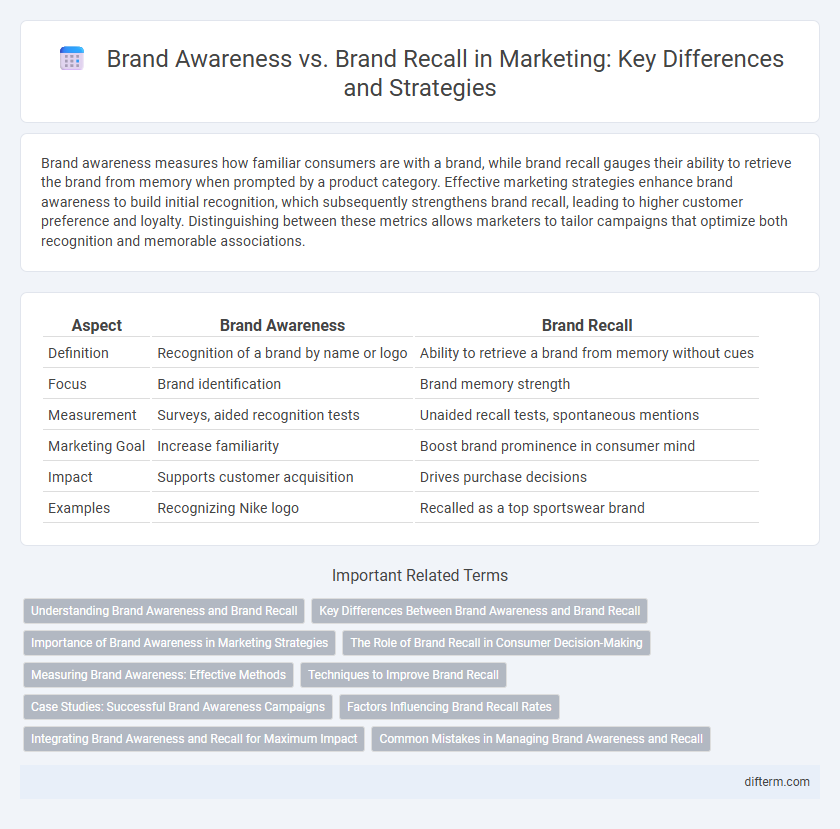Brand awareness measures how familiar consumers are with a brand, while brand recall gauges their ability to retrieve the brand from memory when prompted by a product category. Effective marketing strategies enhance brand awareness to build initial recognition, which subsequently strengthens brand recall, leading to higher customer preference and loyalty. Distinguishing between these metrics allows marketers to tailor campaigns that optimize both recognition and memorable associations.
Table of Comparison
| Aspect | Brand Awareness | Brand Recall |
|---|---|---|
| Definition | Recognition of a brand by name or logo | Ability to retrieve a brand from memory without cues |
| Focus | Brand identification | Brand memory strength |
| Measurement | Surveys, aided recognition tests | Unaided recall tests, spontaneous mentions |
| Marketing Goal | Increase familiarity | Boost brand prominence in consumer mind |
| Impact | Supports customer acquisition | Drives purchase decisions |
| Examples | Recognizing Nike logo | Recalled as a top sportswear brand |
Understanding Brand Awareness and Brand Recall
Brand awareness measures how familiar consumers are with a brand, reflecting the extent to which a brand is recognized within a target market. Brand recall specifically gauges the ability of consumers to retrieve a brand from memory when prompted by a product category. Understanding the distinction helps marketers tailor strategies to enhance both recognition and the spontaneous retrieval of their brand in competitive markets.
Key Differences Between Brand Awareness and Brand Recall
Brand awareness measures the extent to which consumers recognize or are familiar with a brand, often gauged through aided or unaided brand recognition tests. Brand recall assesses a consumer's ability to retrieve a brand from memory without any prompts, reflecting deeper cognitive engagement. The key difference lies in that brand awareness captures recognition, while brand recall indicates stronger brand salience and top-of-mind presence.
Importance of Brand Awareness in Marketing Strategies
Brand awareness is a fundamental metric in marketing strategies because it measures the extent to which consumers recognize and remember a brand, directly influencing customer acquisition and loyalty. High brand awareness increases the likelihood that consumers will consider a brand during their purchasing decisions, thereby improving market share and competitive advantage. Investing in brand awareness initiatives through targeted advertising and consistent messaging strengthens overall brand equity and drives long-term business growth.
The Role of Brand Recall in Consumer Decision-Making
Brand recall plays a critical role in consumer decision-making by enabling customers to retrieve a brand from memory when faced with a purchasing choice. High brand recall increases the likelihood that a brand will be considered and selected, particularly in competitive markets with similar offerings. Effective marketing strategies that enhance brand recall contribute directly to higher conversion rates and customer loyalty.
Measuring Brand Awareness: Effective Methods
Measuring brand awareness involves tracking key metrics such as aided and unaided recall, social media mentions, and website traffic analysis to gauge consumer recognition and engagement. Surveys and focus groups provide valuable insights into brand recall by assessing how easily consumers remember a brand without prompts. Leveraging digital tools like Google Analytics and brand tracking software enhances the accuracy of data collection, enabling marketers to refine strategies and boost overall brand visibility.
Techniques to Improve Brand Recall
Techniques to improve brand recall include consistent visual branding, repetitive messaging across multiple channels, and emotional storytelling that resonates with the target audience. Utilizing mnemonic devices such as catchy jingles or slogans enhances memory retention while personalized advertising increases engagement and recall. Incorporating interactive content and leveraging social proof through testimonials further solidify brand presence in consumers' minds.
Case Studies: Successful Brand Awareness Campaigns
Case studies of successful brand awareness campaigns reveal the strategic use of multi-channel marketing to increase visibility and recognition. Brands like Nike and Coca-Cola leverage consistent messaging and emotional storytelling to embed themselves in consumer memory, boosting both brand awareness and recall. Data from these campaigns show a direct correlation between increased brand exposure and improved recall rates, ultimately driving higher consumer engagement and sales.
Factors Influencing Brand Recall Rates
Brand recall rates are heavily influenced by factors such as message consistency, repetition frequency, and emotional resonance in marketing campaigns. Utilizing distinctive logos, jingles, and slogans enhances memorability, while targeted advertising tailored to specific demographics improves retrieval efficiency. Consumer engagement through interactive content and personalized experiences also significantly boosts brand recall by creating stronger cognitive associations.
Integrating Brand Awareness and Recall for Maximum Impact
Integrating brand awareness and brand recall enhances marketing effectiveness by ensuring that consumers not only recognize a brand but also retrieve it effortlessly during purchase decisions. Leveraging consistent visual identity, memorable messaging, and multi-channel engagement fosters deep brand impressions while reinforcing recall triggers. This strategic synergy drives stronger customer loyalty, higher conversion rates, and sustained competitive advantage in crowded markets.
Common Mistakes in Managing Brand Awareness and Recall
Common mistakes in managing brand awareness and recall include neglecting consistent messaging across all channels, which weakens brand identity and confuses target audiences. Overemphasizing superficial metrics like social media likes instead of tracking meaningful recall metrics reduces the effectiveness of marketing strategies. Failing to engage customers through emotional and memorable experiences limits long-term brand recognition and loyalty.
Brand awareness vs brand recall Infographic

 difterm.com
difterm.com